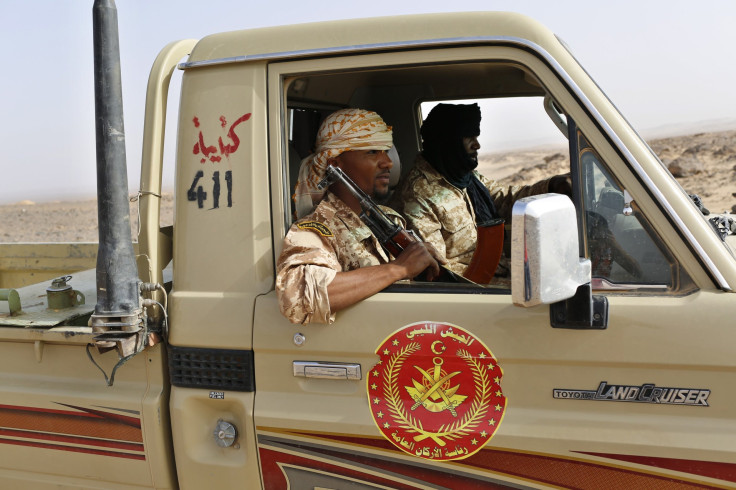Libyan Soldiers Receive Training In Countries Across The World, Return Home To Near-Civil War

After intense fighting in Tripoli this week, the United Nations evacuated its staff from Libya, and the Maltese Air Traffic Service announced that Libyan airspace would close for a month. As Libya falls further into a full-fledged civil war, its government is considering asking the international community to help re-stabilize the country. But efforts are already underway in three countries to support the Libyan militarily.
The U.K., Italy and Turkey are helping Libya’s military as part of an agreement to train so-called general purpose forces. The U.S. is also supposed to begin training Libyan troops at a base in Bulgaria, although an official at the State Department who spoke on condition of anonymity said the contract has yet to be signed.
In a January press release, the U.S. Defense Security Cooperation Agency said it notified Congress of a possible foreign military sale to Libya for “general purpose force training” and associated equipment, parts, training and logistical support worth $600 million.
According to the document, Libya requested training for a general purpose force of between 6,000 and 8,000. The training would include services for up to eight years of training, facilities sustainment, personnel training and equipment, 637 M4A4 carbines and small arms ammunition, as well as other technical and logistical support services.
Frederic Wehrey, a senior associate in the Middle East Program at the Carnegie Endowment for International Peace and an expert on Libya, wrote about the training program in Foreign Affairs in 2013 and critiqued it, saying, “the force’s composition, the details of its training, the extent to which Libyan civilians will oversee it, and its ability to deal with the range of threats that the country faces are all unclear.”
It's almost one year later, and the program’s mission is still unclear.
“The problem is that from the beginning of the program the goal was not defined,” he said. “The U.S. and other partners were trying to ask the Libyan government where the force would be deployed and what would happen to them, but none of the questions have ever been answered.”
Wehrey returned from the country last month and said some of the troops who had been trained in Italy returned home. But, he said, some did not return to work in the Libyan army but instead joined militias based on their existing loyalties.
“There is political disarray in Libya. We are not dealing with a unified Libyan government or defense structure,” he said. “The military is fractured. This throws a wrench in the general purpose force training construct.”
For the past several months, militias in Libya have been vying for power in the major cities. In May, renegade Gen. Khalifa Hifter launched a campaign to take over the government and gained the support of more than 6,000 soliders in the eastern part of the country. The band of rebels attacked government targets and claimed they were fighting off “terrorists.”
“There seems to be little glue to keep the country together at the moment,” Paul Sullivan of the National Defense University in Washington said. “In the chaos that is Libya, with factions splitting loyalties, changing sides and being on the payroll of many groups at different times, it is hard to tell how this may work itself out. The militias as a group will gain a lot of money, power and weapons, and do a lot of damage.”
According to Italian media reports, the first training course for Libyans ended in late June. It was a 14-week training course for 270 soldiers. By the end of the training, the soldiers could operate as light infantry. So far, Italy has trained 1,320 Libyans in Libya and 185 in Italy. Italy, Libya's former colonial master, is also supposed to train up to 2,000 police.
Speaking at the ceremony for the graduation of the first training course in Italy, Adm. Luigi Binelli Mantelli, Italian chief of staff, said that “Italy has been present in Libya since 2011 with Operation Cyrene which supports the National Transitional Council in rebuilding its armed forces … since 2013 there has been an Italian Military Mission to Libya … which intends to extend military cooperation to the defense industry.”
The British army is training more than 300 members of the Libyan security forces at Bassingbourn, in England, which was once closed but opened again specifically to train the Libyans. The U.K. is expected to train up to 2,000 Libyan troops. And Turkey is currently training Libyan police forces. Between the three countries, and if the U.S. joins the effort, more than 20,000 Libyan soldiers will be trained overseas.
The question is whether they will return home to a stablized military structure, or join instead militias in their home towns.
"The entire effort has fallen victim to the political fractures in Libya," Wehrey said. "It is hard to breathe life into something that has been defunct for so long."
© Copyright IBTimes 2025. All rights reserved.





















